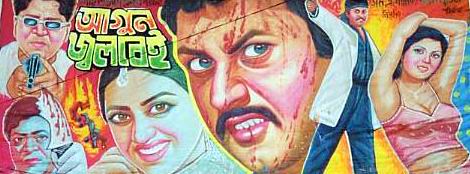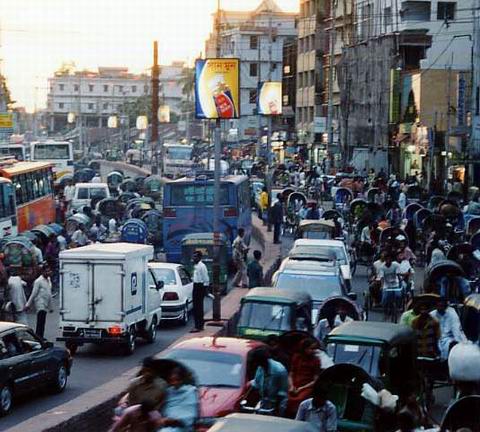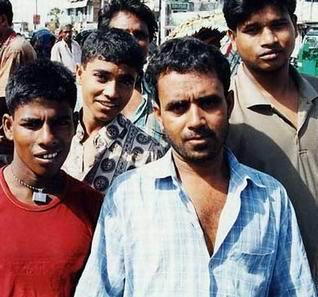|
The Stare Masters of Bangladesh .... by Adam (2004) _________________________________________________________________
What
suburban Canadian youth didn’t grow up dreaming of Bangladesh?
While thoughts of Paris turn to La Tour Eiffel, artists or
decadent nightlife, our fantasies of the Bangladeshi capital of Dhaka
conjure up…uh… well… Moslems… and… um… floods… and…
maybe pirated DVDs? Okay,
so as fantasy holidays go, it’s about as popular as an early-summer
colostomy. But the friendly Bangladeshi people recently treated me
to some colourful culture, lots of mucky curries and Thai
Airways recently started offering direct Chiang Mai - Chittagong
flights. As you can imagine the route is sort of the lima bean of air
routes – it lands on your travel plate only if someone else puts it
there. I went for work. I sat alone in the departure lounge of the sedate Chiang Mai airport hopeful that, as the solitary passenger, I would be able to remove my shirt for in-flight relaxation purposes. But 10 minutes before boarding, 50 short-fat Bangladeshis ruptured the stillness with an assault on the Duty Free shop. Chocolates and perfumes burrowed into their bulging plastic bags as they eyeballed the whiskey, which Bangladesh citizens are restricted from importing (being good Moslems, and all). They probably didn’t need chocolates either, judging by the Ralph Lauren-clad girth on display that day (Curiously, the majority – the impoverished, skinny Bangladeshis – don’t seem to fancy international travel.). But perfume - I thought - seemed advisable.
Yes,
it appeared that Bangladesh was to restore body odour as an arrow in my
quiver of complaints. After sniffing my way through the Thai populace
for five years now, I’ve found nary a smidgen of sharpness emanating
from these, the cleanest folk on our planet. Even Bangkok cab drivers
smell of butterscotch rose petals baked in a pie. Thai cultural practice
calls for 6-8 showers per day and frequent anointings with powder or
cream. But the poor Bangladeshis don’t seem to be endowed with such
sanitary alertness. My airplane row-mate corroborated this – the stink
of his groin following him out of the bathroom and lingering near
the overhead storage bins before sinking onto my lap, staining my
pant-leg. Bangladesh is the most crowded country in the world with 140 millions citizens huddled around a soppy landmass the size of Wisconsin. Once part of the newly minted nation of India, it was released to ‘freedom’ and became East Pakistan, the picked-on runt of the Pakistan family. After a bloody war with its big brother in the 70’s, Bangladesh declared sovereignty. Finally, Bangladeshis could enjoy famine, floods, strikes, coups and riots in peace. I
started in Chittagong, where I stayed at the always-cosy Al Faisal
Hotel. Here they dazzle you with 4-5 bill miscalculations before setting
any charge. As in most Bangladeshi hotels, the management encourage
staff to interrupt guests as often as possible. They knocked on my door
roughly eleven times in my first 24 hours – having me sign documents,
spritzing a haze of noxious disinfectant onto my belongings or shouting
broken English queries toward my air-conditioner. My
hosts in Chittagong were Fayas – the Moslem equivalent of a very
tall ewok – and his band of Rohingyan “journalists” for
which I was to deliver a media workshop. They were about the most
helpful people I’ve ever encountered. But there is a time when
helpfulness strays into maniacal oppression. That point arrived early
with my Rohingyan hosts. (Rohingyans are an oppressed Burmese ethnic
minority forced to flee to Bangladesh) As
in most Burmese cultures, they ensure your comfort by removing all
self-determination from your experience: forcing you to sit in spots
you’d rather avoid, pressing close against your body as you tramp
through crowded streets and imposing mysterious lumps of meat onto your
plate. During our first meal, I kept my dish fully loaded, assiduously
avoiding the hunk that resembled an infant’s hand, only to have Fayas
deliver it to the middle of my rice heap. We exchanged smiles and I
poked at the sides with my spoon, waiting for attention to shift
elsewhere. I was finally able to safely bury it under the refuse on the
bone disposal plate. After
our final day of unwavering companionship, I was ready to retreat to my
room and forgo any further helpful hosting. Our workshop ended at 4pm
and Mohammed popped out to run a quick errand for me. Three chillingly
long hours of forced small talk later, he returned and I was allowed
back to my hotel. Once out of their clutches, I changed into my standard
tropical wardrobe of underpants and eyeglasses, only to have my peace
shattered by a knock containing three Rohingyans wanting a seat on my
sofa. I let them in, saying “Hi…. uh…good to see you… how have
you all been for the last TWO WHOLE HOURS?” They
elbowed their ways across the room, hurled me into the lumpy chair I had
avoided for most of my stay, and sat primly on my bed and sofa. We
talked of refugees, democracy, etc. and they made The
next morning my hotel wake up call came a half hour early. Good thing
because there was Fayas at 615 to help me cap my toothpaste and collect
my socks. We rode a rickshaw to the station and he even boarded the
train, sitting with me until my seatmate scowled him into leaving. The
seven-hour ride from Chittagong to Dhaka was unsettling. Bangladesh was
suffering its worst floods in decades, with 2/3 of its land taken by the
rains. I was startled by the newspaper warning: “Tracks in Danger of
Snapping on Dhaka-Chittagong Rail.” We did indeed have to plough
through the swell, but we remained dry, unlike the soggy villagers
huddled on hilltop shelters. Life
near the rail tracks was forced onto skinny mounds of grass nudging
above the waters where villages and rice fields flourished only weeks
ago. Thousands died from diarrhea and waterborne diseases as the country
tried to drain itself. The floods destroyed millions of homes. Perhaps
it gives us perspective for our next foundation leak or mildew crisis. Luckily,
the Bangladeshi Prime Minister Kaleda Zia sprung into action after only
3 weeks of disaster. Her Mercedes limo delivered her to the banks of the
Dhaka swamp where she bestowed baggies of rice to the unwashed-overwashed
masses. She spent several nose-curling minutes sprinkling sustenance on
her people, managing to keep her delicately gloved fingers from actually
touching any of her dirty, dark citizens. Flash bulbs popped and
videotapes churned and she returned to her estate for a purging cucumber
facial. Bangladesh
is a great place to make lots of new, really aggressive friends. If you
enjoy a good face-shout from a stranger or settling disputes with a blow
to your challenger’s skull, Bangladesh is for you. As sedate as the
Thais are, the Bangladeshi are hostile. This
aggression is manifest in Bangladeshi traffic culture. In Thailand I can
veer into wrong lanes, crush tiny children or collide with market
stalls. The only punishment I receive from Thai drivers is a gentle
giggle and polite docility. But in Bdesh, traffic days burst with
relentless honking, irate threats and purposeful collisions. Drivers
will not relent when blocking each other’s paths. Stare-downs and
shouting matches persist for several minutes before the driver with
the more pressing errand surrenders. Some
foreigners on a bus were treated to a lesson in Bengali conflict
resolution after a stubborn truck held up their bus at a highway curve.
After several minutes of fruitless shouting, passengers emptied out of
the bus to beat and kick the offending truck driver. He was spared just
enough life to drag his bloody body into the cab and remove his truck
from the bus’ path. The passengers returned with satisfied smiles and
handshakes, as if they had just helped an elderly woman jump-start her
Mazda. Dhaka
is a spastic city of 10 million with the murky ventilation of a 1950’s
teachers’ lounge. Convoys of dented vehicles cough out fumes as burqa-clad
women, angry imams, colourfully festooned rickshaws, prim businessmen
and naked children mill about the mucky streets in search of ways to
make a living. There is nary a tourist, so foreigners need to
acclimatize themselves to the relentless, creepy staring. There is a
different sense of privacy (i.e., you don’t get any) th My
Dhaka workshop (with another Burmese refugee group) was notable for our
swift ascent to the apex of workshop dullness. If synchronized yawning
ever becomes a medal sport, I know just who to coach. Participants
stared blankly at sheets while I spat out impatient questions and
eyeballed the clock. I tried in vain to boost the mood by injecting
interactive exercises like, “form small groups and discuss your
stupidity.” It
finally picked up towards the end after I implored a staff member to
take me to the streets to buy coffee. Even that was a challenge. We
spent 20-minutes rambling through hot alleyways, as I pleaded with my
host: “I see it… I see coffee…. No, really… it’s in that
shop…. Can we stop?… that shop has it too… I see it… where are
we going?” I
was ready to return to comparatively tame Thailand and embarked on my
long return journey the next day. Stuck in the Chittagong airport for 5
hours is not a gift for the vigorous traveller. There is nothing to do,
few comfy surfaces and little respite from the oppressive heat and
staring outside. Facing hunger, I was forced to purchase something
called a “mutton burger”. Normally I don’t eat cows or pigs, so I
wasn’t sure about my policy on mutton. Mutton comes from something
called a ‘lamb’, which I believe is in the chicken family, so I gave
it a try. It was a spicy little deal, made creepy by the occasional
crunchy bit. Lamb teeth, maybe? So
Bangladesh will probably remain one of the least visited nations on
earth. With the chronic floods, cyclones, general strikes and bombings,
there are myriad reasons to stay away. But if one does make it there,
they will find a certain charm in the chaos. Er… that’s what you
tell yourself, anyway.
This article appears in Farang Magazine, January 2005.
|
 relentless, ominous staring. It was particularly generous of
them considering 2/3 of their country was underwater at the time.
relentless, ominous staring. It was particularly generous of
them considering 2/3 of their country was underwater at the time.  threats
about coming the next morning to help me get my 7 AM train. I tried to
laugh them off with “heh heh… no, really… you wouldn’t like me
in the morning… bad mood… heh… heh.” They nodded in accord and
finally made their exit.
threats
about coming the next morning to help me get my 7 AM train. I tried to
laugh them off with “heh heh… no, really… you wouldn’t like me
in the morning… bad mood… heh… heh.” They nodded in accord and
finally made their exit. at
allows locals to get involved with your business. Several times I
started street conversations only to lure crowds at the rate of
about 7 new onlookers per minute. One request for directions peaked
with approximately 40 men surrounding my rickshaw, staring at my camera.
at
allows locals to get involved with your business. Several times I
started street conversations only to lure crowds at the rate of
about 7 new onlookers per minute. One request for directions peaked
with approximately 40 men surrounding my rickshaw, staring at my camera.